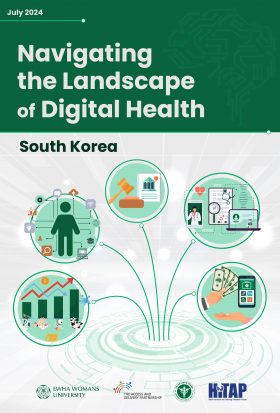This website uses cookies so that we can provide you with the best user experience possible. Cookie information is stored in your browser and performs functions such as recognising you when you return to our website and helping our team to understand which sections of the website you find most interesting and useful.
Navigating the Landscape of Digital Health: South Korea

Details
Executive Summary
Digital health in Korea encompasses a wide range of technologies and services yet lacks a clear legal definition. The Korea Institute for Industrial Economics & Trade (KIET) classifies digital health into hardware, software, and service categories, reflecting the diverse landscape of telehealth, mobile health, and smart healthcare. The Korean government, under the Korean New Deal Master Plan 2.0, has prioritized digital health to address economic challenges exacerbated by COVID-19. Through initiatives like the Digital New Deal, amendments to the Personal Information Protection Act, and investments in smart healthcare infrastructure, Korea aims to harness digital innovation for societal benefit.
Though recent statistics on the domestic digital health market are lacking, estimates suggest significant growth potential. Major ICT companies like Samsung, LG, Naver, and Kakao are investing in telemedicine and AI-based healthcare solutions, while startups like LifeSemantics and MEDIHERE offer digital therapeutics and telemedicine platforms. Regulatory oversight is provided by agencies like the Ministry of Health and Welfare (MOHW) and the Ministry of Food and Drug Safety (MFDS), which enforce laws and evaluate health technologies’ clinical effectiveness. However, challenges persist in regulatory clarity for wearables, mobile medical applications, and telehealth services. Digital literacy in Korea is improving, yet gaps remain, particularly among vulnerable groups like the elderly and low-income individuals. Efforts to bridge this divide are underway, with initiatives like the National Information Society Agency’s digital data gap survey. The Health Technology Assessment (HTA) process for digital health technologies involves rigorous evaluation for insurance coverage, ensuring safety, effectiveness, and cost-efficiency. Guidelines for AI medical imaging and 3D printing technologies exemplify this process, though challenges exist in standardizing evaluations.
Despite challenges such as regulatory hurdles and a diagnosis-centric healthcare system, Korea possesses strengths like advanced ICT infrastructure and government initiatives like the Korean New Deal. Opportunities abound for digital health innovation to address societal needs and propel Korea toward a more equitable and efficient healthcare system.




